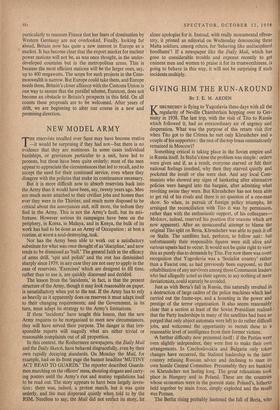NEW MODEL ARMY
THE reservists recalled over Suez may have become restive —it would be surprising if they had not—but there is no evidence that they are mutinous. In some cases individual hardships, or grievances particular to a unit, have led to protests, but these have been quite orderly: most of the men appear to appreciate the circumstances that led to recall, and to accept the need for their continued service, even where they disagree with the policies that make its continuance necessary.
But it is more difficult now to absorb reservists back into the Army than it would have been, say, twenty years ago. Men are much more attached to their civilian jobs and homes than ever they were in the Thirties; and much more disposed to be critical about the annoyances and, still more, the tedium they find in the Army. This is not the Army's fault, but its mis- fortune. However serious its campaigns have been on the periphery, in Korea, in Malaya, and in Kenya, the bulk of its work has had to be done as an Army of Occupation : at best a routine, at worst a soul-destroying, task.
Nor has the Army been able to work out a satisfactory substitute for what was once thought of as 'discipline,' and now tends to be dismissed as 'bull.' The general faith in the efficacy of arms drill, 'spit and polish' and the rest has diminished sharply since 1939: in any case they are not easy to apply in the case of reservists. 'Exercises' which are designed to fill time, rather than to use it, are quickly discerned and derided.
The lesson from the 'incidents,' in fact, is that the present structure of the Army, though it may look reasonable on paper, is unsatisfactory when put to the test. If the Army has to rely as heavily as it apparently does on reserves it must adapt itself to their changing requirements; and the Government, in its turn, must adapt its strategy to the Army's limitations.
If these 'incidents' have taught this lesson, that the new Army requires to be reorganised to meet new circumstances, they will have served their purpose. The danger is that irre- sponsible reports will magnify what are either trivial or reasonable complaints out of all proportion.
In this context, the Rothermere newspapers, the Daily Mail and the Daily Sketch, have behaved disgracefully, even by their own rapidly decaying standards. On Monday the Mail, for example, had on its front page the banner headline 'MUTINY ACT READ TO GUARDS.' The reporter described Guards- men marching on the officers' mess, shouting slogans and carry- ing posters until the Army's riot and mutiny regulations had to be read out. The story appears to have been largely inven- tion : there was, indeed, a protest march, but it was quite orderly, and the men dispersed quietly when told to by the RSM. Needless to say, the Mail did not retract its story, let alone apologise for it. Instead, with really monumental effron- tery, it printed an editorial on Wednesday denouncing these Malta soldiers, among others, for 'behaving like undisciplined hoodlums' ! If a newspaper like the Daily Mail, which has gone to considerable trouble and expense recently to get eminent men and women to praise it for its trustworthiness, is going to behave in this way, it will not be surprising if such incidents multiply.










































 Previous page
Previous page